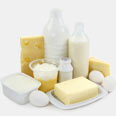
Nasrallah concerned by hummus price?
Following riots prompted by cost of living, Arab world fears soaring food prices will lead to further uprising
But while in Israel the protest is taking place on Facebook or through the boycott of cottage cheese, governments in the Arab world fear that a significant price hike will lead to another wave of riots, which have already swept Syria, Egypt, Tunisia and Yemen.
The fear is shared by rich countries in the Persian Gulf and economically weak countries, like Lebanon, and stems from the soaring food prices worldwide.
Ban on raising milk prices
In Saudi Arabia the government has spent billions to remove any threat of a popular uprising, but authorities in Riyadh are forced to deal with citizens' daily difficulties, as the crisis reaches the dairy products market.
And so, the Saudi government has issued an unequivocal order forbidding retailers to raise milk prices.
Saudi-based al-Marawi company, the biggest producer of dairy products in the Arab world, recently said that company officials were looking into ways to overcome the drop in profit in light of the rise in input prices in global markets.
Company CEO, Abdel Rahman Abdel Muhasin al-Fadli, has ruled out the possibility of raising prices. "It's the last option we're considering," he told Saudi TV recently.
He said that for al-Marawi, which is the leading company in the market, "raising consumer prices is the most difficult thing."
Al-Fadli added that the company was dealing with the current difficulties by increasing its efficiency and cutting production costs. He said the rise in the prices of raw materials did not significantly affect al-Marawi's earnings.
Riots to compensate for price hikes?
In Lebanon the situation isn't any better. Although a new government was established recently with Hezbollah, it has failed to alleviate the growing anger in light of soaring food prices. The bad news for the Lebanese is that the situation is not expected to improve.
George Nasrawi, president of the Syndicate of Lebanese Food Industries, declared recently that prices were expected to rise again soon, after a wave of price hikes. He noted that the price of 1 ton of hummus had gone up by 50% in the global market, from $1,200 to $1,800.
According to Nasrawi, the price of sugar in the global market had surged to $990 per ton, exactly at the start of the jam production season in Lebanon – which would naturally lead to price hikes.
He stressed, however, that the price hike would be gradual, as the Lebanese merchants still had stocks of sugar at the old prices.
Egypt, Syria and Yemen are no longer considered export destinations, he said, due to the uprising and riots in those countries. This has increased the competition between local manufacturers, which may compensate for the expected price hike due to growing food prices across the world.
Doron Peskin is head of research at Info-Prod Research (Middle East) Ltd
- Follow Ynetnews on Facebook










